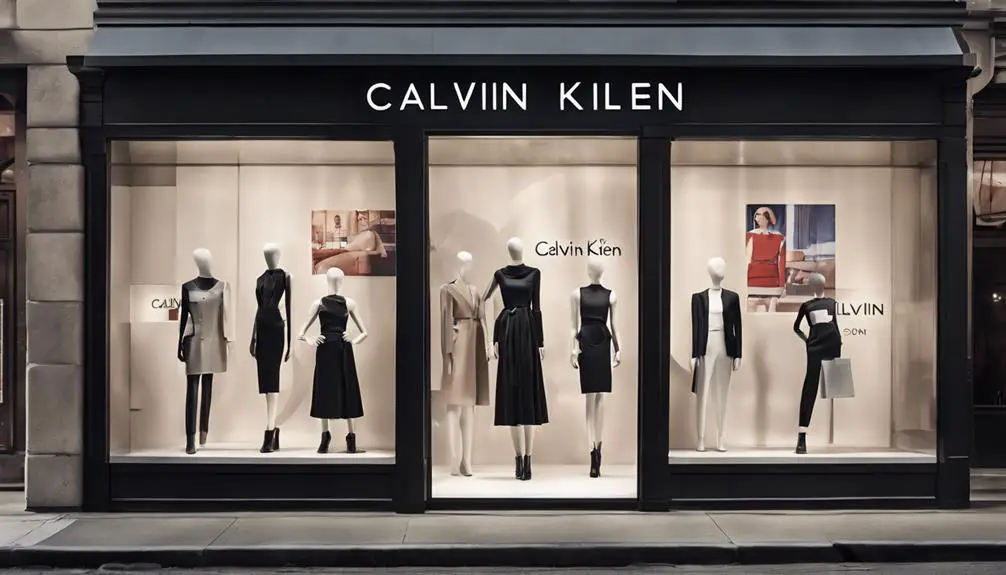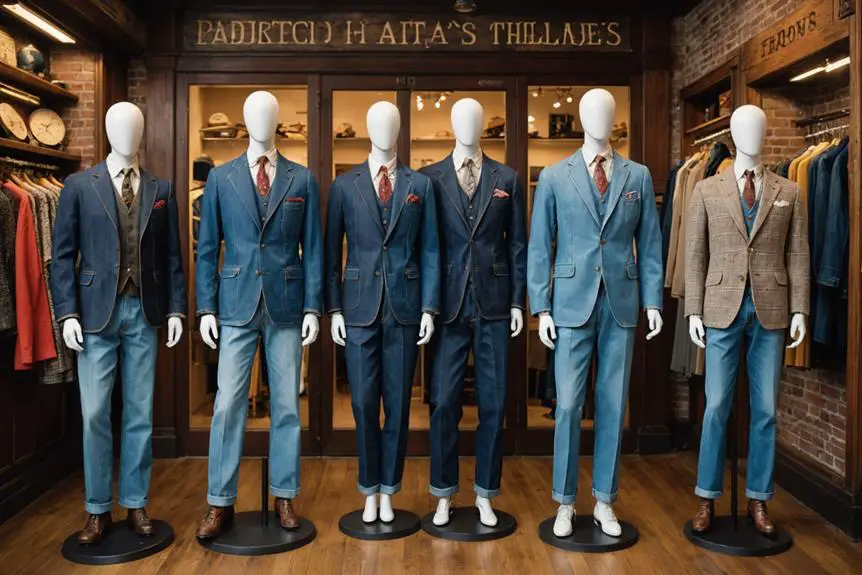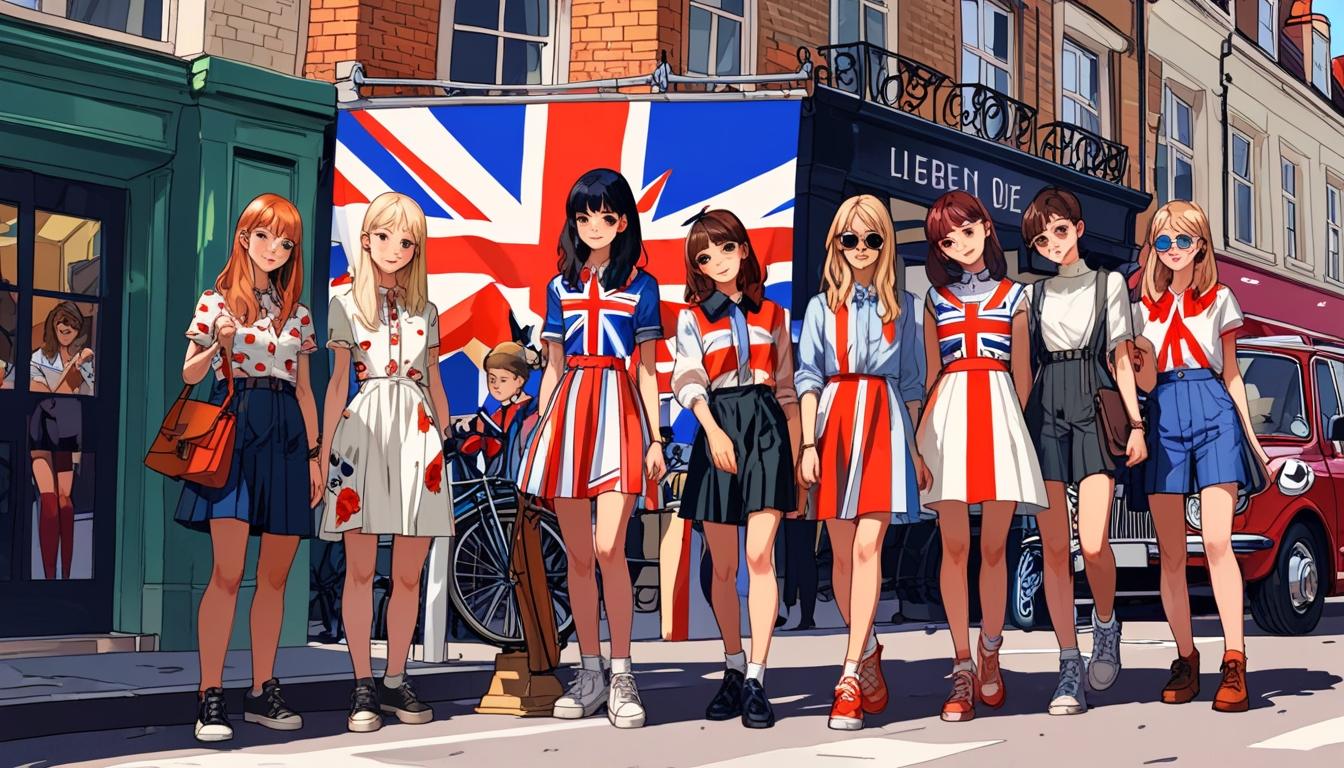You might think the story of Calvin Klein's founding is just another fashion tale, but it's far more intricate than that. Established in 1968 by Calvin Klein and his childhood friend Barry K. Schwartz, the brand initially focused on women's coats and dresses, introducing a minimalist aesthetic that resonated with many. The first collection made its debut at New York Fashion Week, but what happened next is where the real intrigue lies. How did this small operation transform into a global fashion powerhouse in just a few years?
Founding of Calvin Klein

In 1968, Calvin Klein and his childhood best friend Barry K. Schwartz founded a fashion brand that would soon become a household name. Starting primarily with coats and dresses, they aimed to create clothing that embodied a minimalist aesthetic. Their journey began with a successful launch at Bonwit Teller, which immediately garnered attention and laid the foundation for future success.
You'd be amazed to learn that by 1977, Calvin Klein was generating an annual revenue of $30 million! This impressive figure was bolstered by expanding licensing agreements that allowed the brand to reach a wider audience. The brand's evolution was marked by significant milestones, including the launch of iconic products like Calvin Klein Jeans in 1978, which set new standards in the denim market and contributed to the brand's cultural impact.
The real game-changer came in 1978 with the introduction of Calvin Klein Jeans. Imagine the excitement when 200,000 pairs sold within the first week! This launch not only solidified the brand's reputation but also marked a significant turning point in the global fashion market.
Calvin Klein became known for its bold, provocative marketing campaigns that pushed boundaries and challenged conventional norms. As you explore the brand's evolution, it's inspiring to see how it embraced a distinct identity that resonated with many consumers.
Calvin Klein didn't just create clothing; they crafted a lifestyle. The brand's influence continues to be felt today, and its commitment to innovation and excellence remains as strong as ever. Through dedication and vision, Calvin Klein and Barry Schwartz laid the groundwork for a legacy that still captivates fashion enthusiasts around the world.
Early Collections and Recognition
Calvin Klein's early collections quickly established the brand as a formidable player in the fashion industry. Founded in 1968 by Calvin Klein and Barry Schwartz, the duo launched their first collection of coats and dresses at Bonwit Teller, which captured the attention of fashion critics and consumers alike.
In the years that followed, the brand's logo underwent several transformations, reflecting its evolution and logo evolution. In 1973, their groundbreaking designs earned Calvin Klein his first Coty American Fashion Critics Award, marking a significant milestone in the brand's journey.
By 1977, Calvin Klein was on a roll, boasting an annual revenue of $30 million, an indication of the brand's rapid growth and expansion. This success was largely fueled by innovative licensing agreements that allowed the brand to broaden its reach.
The following year, Calvin Klein made waves in the denim market with the launch of his iconic jeans. Selling an astounding 200,000 pairs in the first week alone, these jeans became a staple in wardrobes across America.
As the years progressed into the early 1980s, the brand gained further recognition for its innovative marketing strategies, particularly in men's underwear. Calvin Klein's approach emphasized not just comfort, but also style and identity, revolutionizing how consumers viewed these essential items.
This blend of creativity and strategic thinking set the stage for the brand's lasting impact on the fashion landscape, solidifying Calvin Klein's legacy as a trendsetter and an industry leader.
Iconic Marketing Strategies

Through bold and provocative marketing strategies, Calvin Klein has carved out a unique identity in the fashion world. The brand's approach has always been fearless, with iconic campaigns like the infamous 1980 ad featuring Brooke Shields, which sparked intense debate and firmly established its reputation in the fashion industry.
By consistently leveraging celebrity endorsements, Calvin Klein has connected with younger audiences, featuring stars like Kendall Jenner and Justin Bieber to boost brand visibility on social media platforms.
In 2014, the #MyCalvins campaign emerged, gaining massive traction with over 100,000 posts within its first year, emphasizing user-generated content that actively engages consumers. This innovative approach not only highlighted the brand's appeal but also made customers feel like part of the Calvin Klein community.
Recognizing the shift in consumer behavior, Calvin Klein adopted a digital-first strategy in 2018, phasing out print ads for enchanting video content. This move allowed the brand to adapt and resonate with an audience increasingly immersed in digital platforms.
Alongside these strategies, high-profile campaigns aimed to challenge traditional beauty standards and celebrate body diversity. This commitment aligns the brand's messaging with contemporary societal trends, making Calvin Klein not just a fashion label but a cultural touchstone.
Through these iconic marketing strategies, Calvin Klein has proven its ability to evolve while maintaining a strong connection with its audience, cementing its place in the fashion industry.
Legal Challenges and Controversies
Provocative advertising has often landed the brand in hot water, leading to numerous legal challenges and controversies over the years. One of the most notable incidents was in 1980 when Calvin Klein's campaign featuring Brooke Shields drew massive attention and was banned by several TV stations due to its suggestive content.
Fast forward to 1995, and Klein faced significant backlash and even a federal investigation for another jeans campaign that many deemed inappropriate, raising critical questions about decency in advertising.
In addition to these controversies, Klein found itself embroiled in legal disputes, such as the 2012 design patent litigation with Lululemon, which ended in a settlement. This was just one of many instances that highlighted the brand's ongoing struggles with maintaining a clean legal slate.
The 1999 ad campaign featuring children in underwear ignited nationwide outrage, further escalating ethical questions about the limits of advertising. Not surprisingly, this led to a public outcry regarding inappropriate marketing practices.
Moreover, accusations have surfaced about Calvin Klein's connections to forced labor, especially concerning Uyghur labor camps, which have cast a shadow over the brand's reputation.
As you can see, while Calvin Klein has undeniably revolutionized fashion and advertising, it hasn't been without its fair share of legal and ethical challenges, forcing the brand to continually navigate a complex landscape of public perception and accountability.
Brand Evolution and Growth

Founded in 1968 by Calvin Klein and Barry K. Schwartz, the brand quickly evolved from its initial focus on coats and dresses to become a powerhouse in the fashion industry.
By 1977, Calvin Klein had achieved impressive annual revenue of $30 million, thanks in part to its savvy licensing agreements and an expanding array of product offerings. The launch of Calvin Klein Jeans in 1978 was a game-changer, selling 200,000 pairs in just one week, which solidified the brand's dominance in the denim market.
As the brand continued to grow, it revolutionized men's underwear in the early 1980s, introducing stylish options that prioritized identity. The introduction of iconic products like boxer briefs in the 1990s captured attention and transformed perceptions of men's undergarments. This shift emphasized not only comfort but also an alluring aesthetic.
Over the decades, Calvin Klein's brand evolution reflected a shift from playful designs to a seductive chic style, embracing minimalist design principles that resonated with consumers.
By 2022, the brand's global retail sales soared to approximately $9.3 billion, showcasing its remarkable growth trajectory.
Today, Calvin Klein remains a symbol of modern sophistication, continually adapting to market demands while staying true to its roots.
As you explore the brand's journey, it's clear that its combination of innovative design and strategic expansion has cemented its status as a leader in the fashion world.




